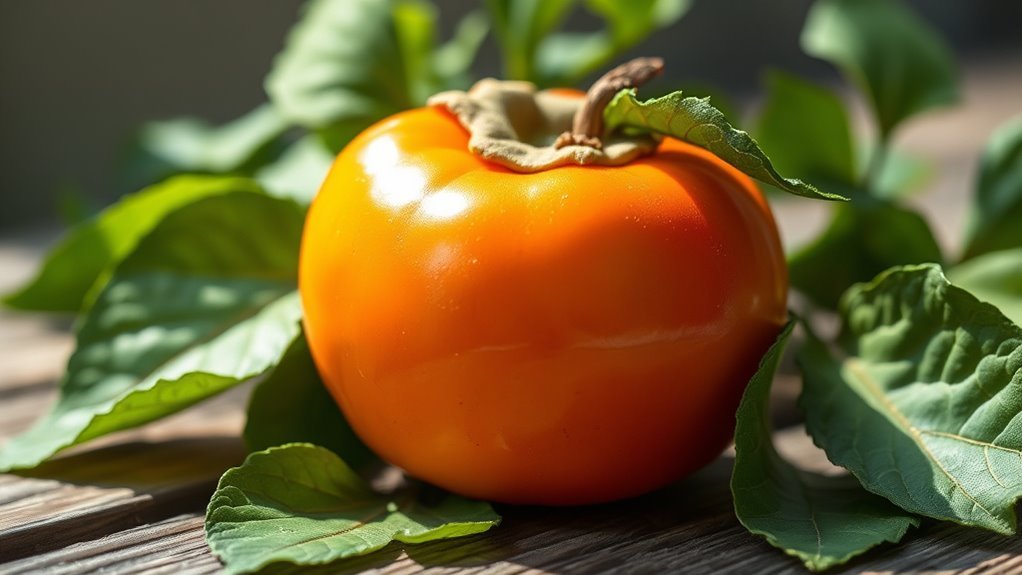Persimmons aren’t typically considered keto-friendly due to their relatively high carbohydrate content, with a medium persimmon containing about 31 grams of carbs. This can make it tough to maintain ketosis, especially if you’re following a strict low-carb diet. While they do offer nutritional benefits, like vitamins and antioxidants, it’s best to limit your intake or choose lower-carb fruits. You might find some tasty alternatives that fit better into your keto lifestyle. Explore those options to enhance your diet!
Understanding the Ketogenic Diet

When you’re exploring the ketogenic diet, it’s vital to understand its core principles and how it functions. At its heart, the keto diet emphasizes low carbohydrate intake, typically around 20-50 grams per day, which pushes your body into a state of ketosis. In this state, your body burns fat for fuel instead of carbohydrates. You might encounter various diet variations, such as cyclical or targeted keto, each tailored to different lifestyles and fitness goals. While the primary focus is on high-fat consumption, you’ll also want to reflect on the quality of fats and proteins you’re incorporating. This balanced approach helps you maintain energy levels while enjoying the freedom to customize your diet according to your preferences. Understanding these keto principles is essential for success.
Nutritional Profile of Persimmons

When considering the nutritional profile of persimmons, it’s important to examine their carbohydrate content and the vitamins and minerals they offer. These fruits are relatively high in carbohydrates compared to other low-carb options, which could impact your ketogenic goals. However, persimmons are also rich in essential nutrients that provide various health benefits, making them worth discussing in the context of your diet.
Carbohydrate Content Analysis
Persimmons contain a notable amount of carbohydrates, which is essential to bear in mind when evaluating their compatibility with a ketogenic diet. A medium persimmon has about 31 grams of carbs, which can impact your daily intake considerably. It’s important to regard carbohydrate absorption, as this can influence your blood sugar levels, particularly if you’re sensitive to carbs. However, persimmons also provide dietary fiber, which can help slow down the absorption of sugars and promote digestive health. This balance might make them a more suitable choice for those who can incorporate moderate carbs into their diet. Ultimately, whether persimmons fit into your keto lifestyle depends on your overall carb allowance and personal dietary preferences.
Vitamin and Mineral Benefits
Although you may be focused on carbohydrate content, it’s crucial to take into account the vitamin and mineral benefits that persimmons offer. These fruits are packed with nutrient density, providing essential vitamins like A, C, and E, along with minerals like potassium and manganese. The high vitamin C content supports your immune system, while vitamin A contributes to eye health. Additionally, persimmons boast impressive antioxidant properties, which can help combat oxidative stress and inflammation. Including them in your diet not only enriches your nutritional intake but also supports overall wellness. So, while you navigate your keto journey, remember that the benefits of persimmons extend beyond just their carb count, making them a worthwhile consideration for a balanced diet.
Carbohydrate Content in Persimmons

While you might be attracted to the sweet, juicy flavor of persimmons, it’s essential to evaluate their carbohydrate content, especially if you’re following a keto diet. Different persimmon varieties have varying carbohydrate levels, making it important to understand these differences for accurate carbohydrate comparisons.
Here’s a brief overview:
| Persimmon Variety | Carbohydrates (per 100g) | Net Carbs (after fiber) |
|---|---|---|
| Fuyu | 15.9g | 13.0g |
| Hachiya | 21.0g | 18.5g |
| Chocolate | 18.5g | 15.0g |
| American | 24.0g | 21.5g |
Understanding these numbers can help you make informed choices while enjoying your keto lifestyle.
Glycemic Index and Its Importance
For anyone managing their carbohydrate intake, understanding the glycemic index (GI) of foods like persimmons can be incredibly helpful. The GI measures how quickly a food raises your blood sugar levels after consumption. Foods with a high glycemic impact can lead to rapid spikes in blood sugar, while those with a low GI promote steadier levels. Persimmons generally fall into the moderate range, meaning they can affect your blood sugar, but not as dramatically as high-GI foods. This knowledge empowers you to make informed choices aligned with your dietary goals, allowing for greater freedom in your eating habits. Balancing enjoyment and health is key, and knowing the GI can help you navigate that balance effectively.
Comparing Persimmons to Other Fruits
When you compare persimmons to other fruits, it’s essential to take into account their nutritional profiles and carbohydrate content. Persimmons typically contain more carbohydrates than berries but fewer than bananas. This makes them a unique option for those monitoring their carb intake. In fruit comparisons, persimmons offer a range of vitamins and minerals, including vitamin A and manganese, which can provide notable health benefits. While they may not be the ultimate low-carb choice, their rich flavor and texture can satisfy your sweet cravings without completely derailing your diet. Ultimately, understanding persimmons benefits and how they stack up against other fruits helps you make informed choices that align with your dietary goals.
Potential Health Benefits of Persimmons
Persimmons not only offer a unique flavor profile compared to other fruits, but they also come packed with several health benefits that can contribute to your overall well-being. Rich in vitamins A and C, persimmons support immune function and skin health. Their high fiber content aids digestion and promotes gut health, making them a smart choice for anyone. Furthermore, persimmons boast impressive antioxidant properties due to compounds like flavonoids and carotenoids, which help combat oxidative stress and may reduce the risk of chronic diseases. Including persimmons in your diet can also assist in regulating blood pressure and cholesterol levels. Overall, their diverse health benefits make persimmons a worthy addition to a balanced lifestyle, especially for those seeking freedom in their dietary choices.
How to Incorporate Persimmons Into Your Diet
Incorporating persimmons into your diet can be both enjoyable and nutritious. You can snack on them fresh, slice them into your favorite salads, or even blend them into smoothies for added sweetness. Their unique flavor and texture can enhance a variety of dishes while providing beneficial nutrients.
Snack Ideas With Persimmons
If you’re looking for creative ways to enjoy persimmons as part of your diet, there are plenty of delicious snack ideas to explore. You can start with persimmon chips, which are easy to make by baking thin slices until crispy. For a revitalizing drink, whip up a persimmon smoothie with yogurt or nut butter. Dried persimmons make for a chewy, sweet treat on-the-go. If you’re in the mood for something savory, try persimmon salsa or persimmon salsa verde to spice up your meals. For a sweet touch, consider persimmon desserts or energy balls. Finally, bake some persimmon muffins for a nutritious breakfast or snack. Enjoy experimenting with these versatile options!
Persimmons in Salads
Adding persimmons to salads can elevate your meals with their unique flavor and texture. These vibrant fruits not only enhance taste but also provide nutritional benefits. You can create a delicious persimmon salad by combining them with complementary ingredients. Here are three ideas to get you started:
- Mixed Greens: Toss sliced persimmons with arugula, goat cheese, and walnuts for a fresh, crunchy salad.
- Citrus Twist: Pair persimmons with orange segments, red onion, and a light keto dressing for a zesty option.
- Grain Bowl: Mix persimmons with quinoa, spinach, and a balsamic vinaigrette for a hearty meal.
Experimenting with different combinations allows you to enjoy persimmons while keeping your diet exciting and nutritious!
Portion Control and Serving Sizes
While persimmons can be a delicious addition to your diet, understanding portion control and serving sizes is essential, especially on a keto regimen. These fruits are higher in carbohydrates compared to other keto-friendly options, so it’s vital to be mindful of how much you consume. A typical serving size is about 100 grams, which contains approximately 15 grams of carbohydrates. If you’re aiming to maintain ketosis, limiting your intake to a few slices or a small persimmon may be wise. By practicing portion control, you can enjoy the unique flavor of persimmons while staying within your carb limits. Remember, moderation is key to balancing the enjoyment of this fruit with your keto goals.
Alternatives to Persimmons on a Keto Diet
If you’re looking for alternatives to persimmons on a keto diet, there are several options to contemplate. Low-carb fruits like berries can satisfy your sweet cravings, while nut-based snacks offer healthy fats and protein. Additionally, incorporating vegetable substitutes can provide essential nutrients without adding excess carbs to your meals.
Low-Carb Fruit Options
Although persimmons can be a tasty treat, they may not fit into a strict keto diet due to their higher carbohydrate content. Thankfully, there are plenty of keto-friendly fruits that can satisfy your cravings without breaking your carb budget. Here are three great low-carb fruit options to take into account:
- Berries – Strawberries, raspberries, and blackberries are low in carbs and high in fiber, making them perfect for snacking.
- Avocado – Technically a fruit, avocados are loaded with healthy fats and fiber, keeping you full and satisfied.
- Olives – These are not only low in carbs but also packed with healthy fats, making them a delicious and nutritious option.
Incorporating these low-carb snacks can help you maintain ketosis while enjoying flavorful fruits.
Nut-Based Snacks
When looking for satisfying snacks on a keto diet, nut-based options can be an excellent alternative to fruits like persimmons. Nuts like almonds, walnuts, and macadamias are low in carbs and high in healthy fats, providing essential nutrition benefits. They help keep you full, making it easier to resist high-carb temptations. You can whip up simple snack recipes like spiced nut mixes or nut butter bites, which are both delicious and keto-friendly. Additionally, nuts are rich in fiber, protein, and vitamins, contributing to overall health. By incorporating these versatile snacks into your diet, you can enjoy flavorful options while maintaining your keto lifestyle, ensuring you feel free to indulge without compromising your goals.
Vegetable Substitutes
What are some tasty vegetable substitutes for persimmons on a keto diet? If you’re looking for healthy swaps that fit your low-carb lifestyle, consider these keto vegetables:
- Bell Peppers – Their sweet, crisp texture can mimic the invigorating bite of persimmons.
- Zucchini – This versatile vegetable absorbs flavors well and can be used in salads or stir-fries.
- Radishes – With a slightly sweet and peppery taste, radishes can add a unique crunch to your dishes.
These alternatives not only keep your carb count low but also provide essential nutrients. By incorporating these keto-friendly options, you can enjoy variety in your meals without compromising your dietary goals. Embrace the freedom of creativity in your keto journey!
Expert Opinions on Persimmons and Keto
Many experts agree that while persimmons are delicious, they might not be the best choice for a strict ketogenic diet. With keto guidelines typically allowing only 20-50 grams of carbs per day, the higher carbohydrate content of most persimmon varieties can push you over that limit. For instance, a single persimmon can contain around 31 grams of carbs, which is significant for those monitoring their intake closely.
However, if you’re looking for a little sweetness occasionally, you could incorporate small amounts into your diet. It’s all about balance. Just be mindful of how they fit into your overall carb count. Ultimately, moderation is key if you want to enjoy persimmons without derailing your keto journey.
Frequently Asked Questions
Can I Eat Dried Persimmons on a Keto Diet?
Eating dried persimmons on a keto diet is like walking a tightrope; it requires balance and caution. While they’re delicious and can serve as a sweet treat, dried fruit often contains higher sugars, which can disrupt ketosis. If you’re looking for keto snacks, it’s best to limit or avoid dried persimmons. Instead, consider alternatives like nuts or seeds that align better with your dietary goals without sacrificing flavor or satisfaction.
What Is the Best Time to Eat Persimmons?
The best time to eat persimmons is when they’re ripe, as that’s when their nutrients are most abundant. Enjoying them as a mid-morning snack or in a salad can provide a revitalizing boost. The ideal serving size is one medium persimmon, offering vitamins A and C, fiber, and antioxidants. Integrating persimmons into your diet can contribute to overall health, making them a delightful, nutrient-rich choice throughout the day.
Are Persimmons High in Sugars?
When you’re considering your fruit options, you might wonder if persimmons are high in sugars. With a sugar content of around 12 grams per fruit, they’re sweeter than some alternatives, like berries. For instance, if you had a friend who switched from eating bananas to persimmons, they might notice a difference in their sugar intake. While they can satisfy a sweet tooth, you should balance them with lower-sugar fruits in your diet.
How Do Persimmons Affect Ketosis?
When considering how persimmons affect ketosis, it’s important to look at their nutrition profile. Persimmons are relatively high in natural sugars, which can impact ketosis if consumed in large amounts. If you’re aiming for a strict ketogenic diet, you might want to limit your intake. However, enjoying them in moderation can still allow you to savor their unique flavor without completely derailing your ketosis goals. Balance is key for freedom in your dietary choices.
Can Persimmons Be Included in Keto Desserts?
You can definitely include persimmons in keto desserts, but moderation’s key due to their higher carb content. If you’re looking for keto-friendly alternatives, consider using persimmons as a natural sweetener in recipes like smoothies or puddings. There are plenty of persimmon recipes that can be adapted to fit your keto lifestyle. Just remember to balance their use with other low-carb ingredients to maintain your ketosis goals without sacrificing flavor.
1. Are persimmons keto-friendly?
Persimmons are generally not considered keto-friendly due to their higher carbohydrate content. A medium persimmon contains around 30 grams of carbs, which can quickly use up your daily carb allowance on a ketogenic diet. However, if consumed in moderation and balanced with lower-carb foods, they can potentially fit into a more flexible low-carb approach.
2. How many carbs are in persimmons?
A medium-sized persimmon typically contains about 30 grams of carbohydrates, including about 5 grams of fiber. The net carbs, which are the total carbs minus fiber, would be around 25 grams. This amount can be quite high for those following a strict ketogenic diet, which usually limits daily carb intake to 20-50 grams.
3. Can I eat persimmons on a low-carb diet?
If you are following a low-carb diet rather than a strict keto diet, you might be able to enjoy persimmons in moderation. Incorporating small amounts can add flavor and nutrients to your meals without dramatically increasing your carb intake. Always consider your total daily carb goals when adding fruits like persimmons to your diet.
4. Are there any health benefits to eating persimmons?
Yes, persimmons are rich in vitamins A, C, and E, and are a good source of dietary fiber and antioxidants. These nutrients can support immune function, promote gut health, and provide anti-inflammatory benefits. However, due to their high carb content, it’s advisable to consume them in moderation if you’re on a ketogenic diet.
5. What are some keto-friendly alternatives to persimmons?
If you are looking for keto-friendly fruit alternatives, consider berries such as strawberries, raspberries, and blackberries. These fruits are lower in carbs and high in fiber, making them suitable for a ketogenic diet. Avocados and olives are also excellent low-carb options that can provide healthy fats and essential nutrients.
References
- https://en.wikipedia.org/wiki/Persimmon
- https://www.healthline.com/nutrition/keto-diet-foods
- https://www.ncbi.nlm.nih.gov/pmc/articles/PMC6266060/
- https://www.medicalnewstoday.com/articles/323255
- https://www.verywellfit.com/persimmons-and-the-keto-diet-5196530
- https://www.heart.org/en/healthy-living/healthy-eating/eat-smart/nutrition-basics/understanding-carbohydrates
- https://www.webmd.com/diet/obesity/persimmons-health-benefits
- https://www.nutritionvalue.org/persimmons%2C_raw_nutritional_value.html


